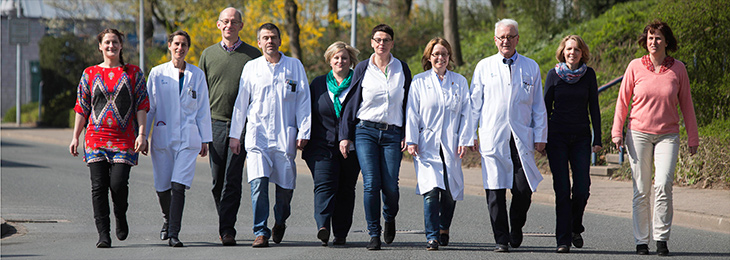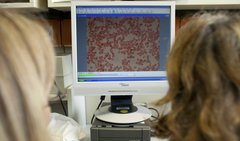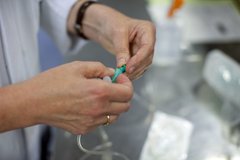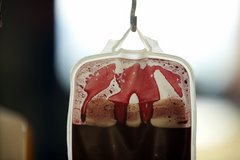Leukaemias
In Germany about 2,000 children and adolescents are diagnosed with cancer every year. Leukaemias and lymphomas are the most common, representing approximately one third of the malignant diseases.
Our bone-marrow laboratory, which is headed by Prof. Dr. Claudia Rössig, has extensive experience, going back many years, in the assessment of blood count and bone marrow changes. In the field of acute leukaemias, the morphological, cytochemical and immunophenotypic evaluation of the material is performed on site. In these evaluations, blood and bone marrow samples are stained in order that they can subsequently be evaluated either microscopically or by means of flow cytometry. There is close cooperation with the reference laboratories of the GPOH (German Society of Paediatric Haematology and Oncology). The treatment of leukaemias and lymphomas consists of intensive chemotherapy in accordance with the standards of the GPOH.
Contact: Prof. Dr. Claudia Rössig
Haematopoietic stem-cell transplants
Allogenic stem-cell transplants in children are performed at the interdisciplinary Bone Marrow Transplant Centre; this is a centre which is run jointly by Medical Clinic A (Haematology, Haemostasis, Oncology and Pneumology), headed by Prof. Dr. Wolfgang Berdel, and the Clinic of Paediatric Haematology and Oncology headed by Prof. Dr. Claudia Rössig. In an allogenic stem cell transplant, the patient's bone marrow is replaced with new bone marrow after appropriate pre-treatment. It is such transplants in children with leukaemias and congenital or acquired forms of bone marrow failure which are most frequently required. Until the donor cells have grown, the patients are largely unprotected against infection. Their immune system is further weakened by drugs which are designed to ensure good compatibility of the donor cells. For this reason the premises of the KMT Centre are equipped with special air filtration systems which provide a shield for the patient against germs.
Autologous transplants represent a form of high-dose chemotherapy. In order to enable or shorten the blood-formation recovery process after intense chemotherapy, the patient's stem cells are collected during an earlier phase of the treatment and returned to the patient after the high-dose chemotherapy. As these are the patient's own cells, it is not necessary to perform any additional treatment which weakens the immune system and enables the cells to grow in the case of allergenic transplants. This type of transplant can therefore be carried out on paediatric oncology ward 17A West.
Contact: Prof. Dr. Claudia Rössig
Lymphomas and solid tumours during childhood: bones and soft tissue tumours, neuroblastomas, Wilms' tumours, germ cell tumours, brain tumours
With the guidance of the corresponding national study centres, our clinic specializes in the following cancers during childhood:
- Lymphomas
Contact: Associate Professor Dr. med. Birgit Burkhardt - Rhabdoid tumours
Contact: Dr. Kornelius Kerl
Research
- Biology of Ewing's sarcomas
- Cellular immunotherapies for leukaemias and sarcomas
- Development of brain tumours in childhood
- Paediatric infectiological research programme
- Clinical and experimental pharmacology











